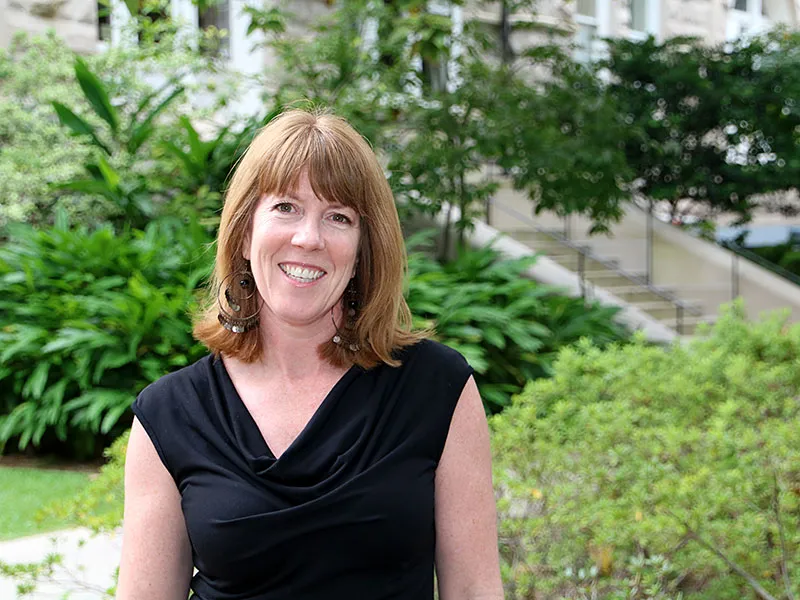
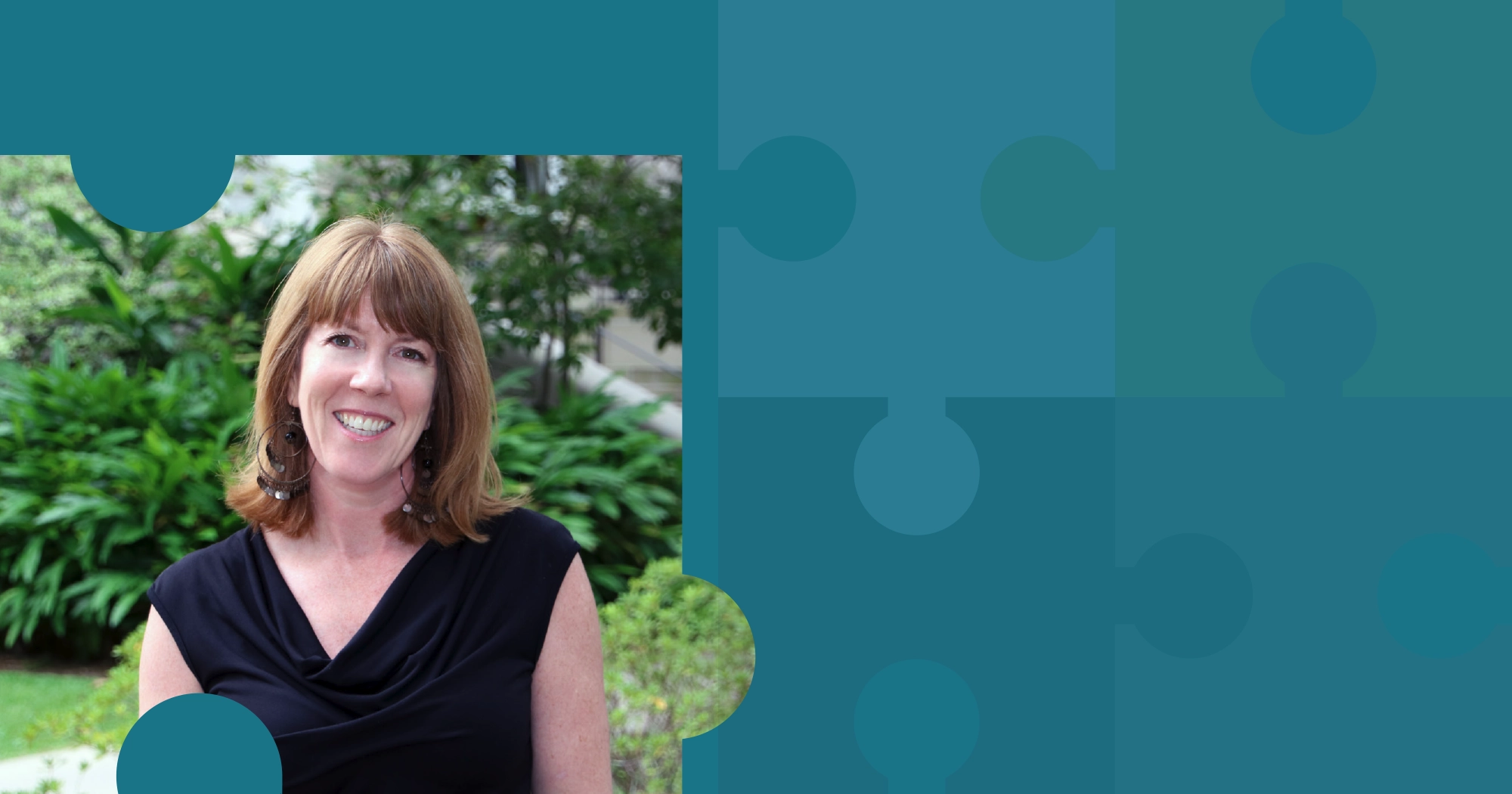
Originally published in the 2024 issue of the School of Liberal Arts Magazine
When I was a child, National Geographic magazine was a coffee table staple in my home. I was always so excited when a new issue would arrive in the mail. I would immediately plunk myself down on the living room floor and start leafing through the pages, fascinated by the descriptions of the research and the incredible photographs of people, places, and animals. I have little doubt that this early and sustained exposure to research had an enormous impact on my own trajectory that led me to become a biological anthropologist studying wild primates. Today’s social media, web pages, and on-demand streaming enable us to easily share our research with even wider audiences.
What is missing from these sources, however, is the behind-the-scenes accounts of how researchers move from an idea to the output we are viewing: the films, the performances, the manuscripts, the books. Below, several of our amazing faculty share snippets of their own research journeys. They describe the earliest stages of research, which can begin with an idea, a question, or even a conversation. They discuss the ins and outs of finding funding to support the project, take us through their project planning, data collection, and finally the dissemination of their results. The collaborations forged and friends made along these journeys are among the unspoken benefits of this work. One of the best parts of my job is learning about the incredibly rich and diverse research our faculty are engaged in and helping them to secure the funding they need to continue their work or launch their next project.
A Spark of an Idea
Chelsea Stieber, Associate Professor & Kathryn B. Gore Chair in French
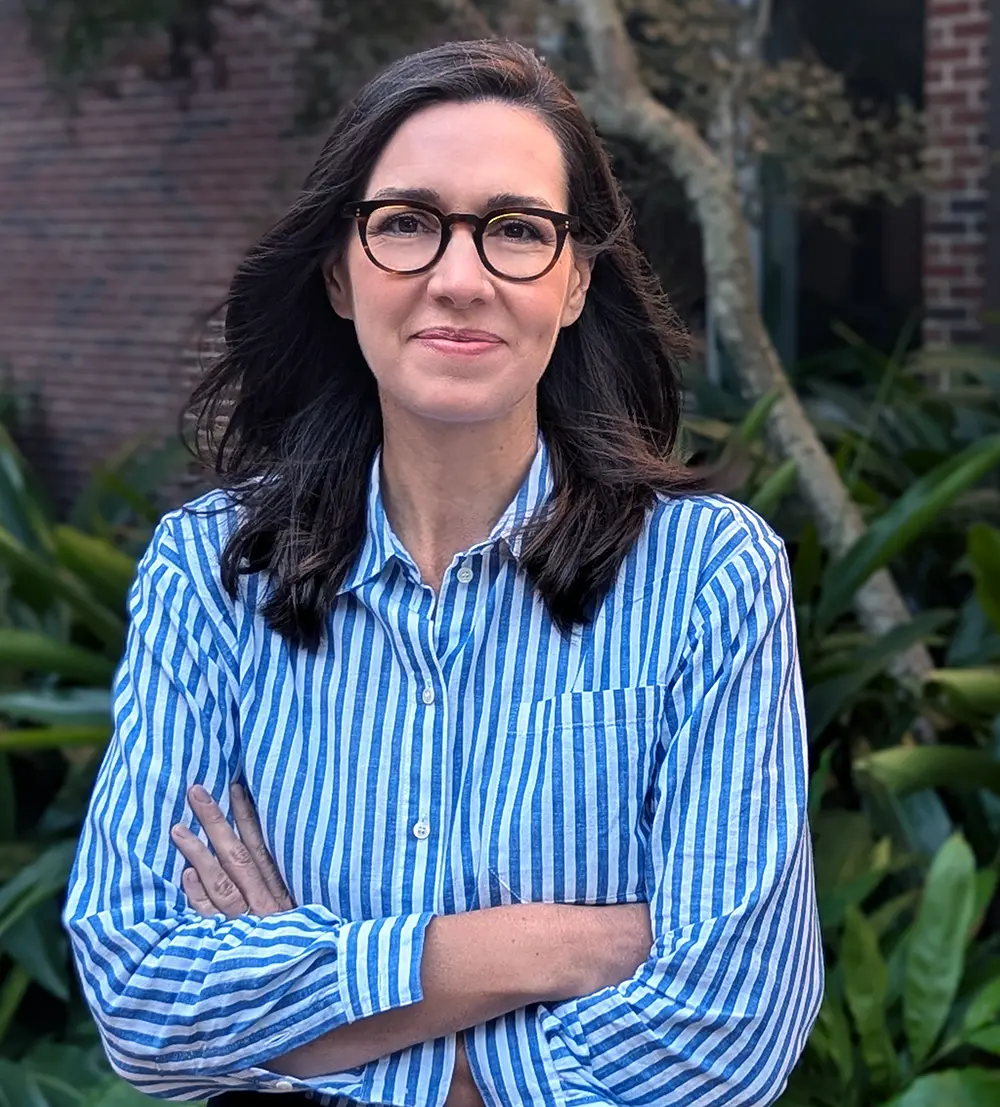
New research often presents itself as just a flicker or a spark of an idea: a thought we jot down in passing, an inkling we ferret away into a footnote, or a long-held suspicion we never manage to get around to investigating. The potential is there but we need time to grow it into something sustainable. The means by which we find time and energy to do that looks quite different for every scholar. In my own area of study — the literature, politics, and history of Haiti and the French Caribbean — one of the primary avenues to grow new research is through individual fellowships. These competitive financial awards, associated with institutions like libraries, research centers, universities, and federal agencies, afford scholars an intense period of initial research — as short as a few weeks or as long as several years — that allow us to build that spark into a fire. In order to access manuscript collections, rare print materials, or secondary collections related to the revolutionary Caribbean, for instance, scholars in my field secure fellowships at the New York Public Library’s Schomburg Center for Research in Black Culture, the Library of Congress’s Kluge Center, or the John Carter Brown Library at Brown University, to name only a few.
Beyond these more traditional individual fellowships, my field is moving increasingly toward new types of cross-institutional collaborative grants that seek to connect humanistic research with the wider communities and publics it impacts. For instance, Tulane School of Liberal Arts professors and graduate students have contributed to two exciting projects that received grants through the National Archives’ National Historical Publications & Records Commission (NHPRC): Keywords for Black Louisiana (Johns Hopkins University), a community-engaged digital edition of annotated, transcribed, and translated manuscript documents from 18th-century French and Spanish Louisiana; and the Revue des Colonies (University of Maryland), a documentary edition of the first French periodical directed by people of color that published Black authors from France, the Caribbean, and New Orleans. Students involved in these projects had opportunities to engage in community outreach, website text encoding, editing, as well as traditional archival research.
The NHPRC grants are multi-year and collaborative, expressly dedicated to making public research that has historically been contained within the academy, precisely by engaging in the communities whose histories are concerned. They emphasize outreach and stakeholder engagement, and foster connections between humanistic research and the public. These grants attest to the deep cultural and historical significance of New Orleans and the importance of making the stories of the Black lives and legacies tied to the city accessible to the widest public. What is more, they offer innovative frameworks for initiating new humanistic research that forges meaningful, durable connections between the university and the community.
Challenging the Traditional
John “Ray” Proctor III, Associate Professor of Theatre & Dance
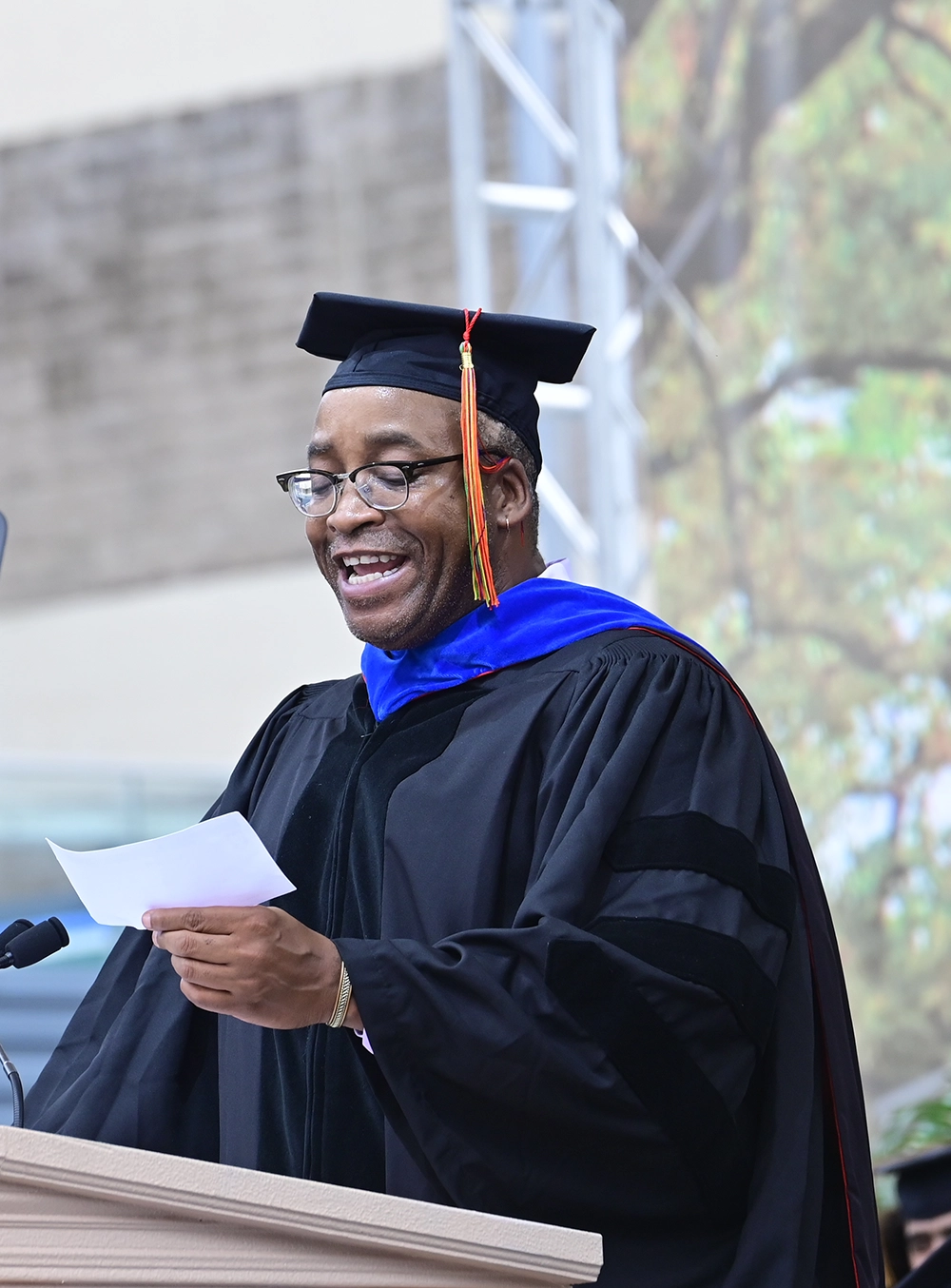
In the year before the pandemic, the Folger Institute — in an effort to determine how the Shakespeare Folger Library could exist outside of the building itself — started pursuing a refresh that would help bring Shakespeare to a wider audience. Professor of English Michael Kuczynski and I partnered on a grant proposal that asked “How does America negotiate its North vs. South identity through Shakespeare?” Folger not only accepted our proposal but awarded us a twin grant alongside the University of Buffalo, so that the South and North could host conferences to discuss Shakespeare in our regions.
In the current field of Shakespeare in America, scholars have been addressing the ways his work has been used as a tool of colonialism: to divide people culturally and racially, to oppress and gatekeep. The discussion is becoming “How do we keep Shakespeare alive and relevant?” But when people of color and women ask, “Relevant to whom?”, such questions push the establishment to realize all voices need to be brought in, including LGBTQI, AAPI, Black and Indigenous people, and anyone else who is not a cis-gendered white man.
With the Folger’s funding, we were able to invite 30 scholars from across the United States to participate in “Rac(e)ing the Shakespearean Archive: Antebellum, Civil War, and Reconstruction New Orleans.” We talked about Shakespeare academically, in literary studies, in performance — everywhere. We were also able to visit The Historic New Orleans Collection to view Shakespeare-themed Mardi Gras float drawings from 1896, tour Le Petit Theatre to explore what live theater looks like in New Orleans, and attend a production of “8 Othellos” at the André Cailloux Center for the Performing Arts and Cultural Justice.
It’s an exciting time for what Shakespeare could be in the city of New Orleans. There’s so much potential — not just that Shakespeare offers more or further cultural elitism — but we have the opportunity to invite the traditionally underrepresented and disenfranchised into theater, academics, and the world of Shakespeare. With representation from the Departments of English, Art History, Theatre & Dance, and the Digital Media Practices Program, among others, the School of Liberal Arts can become a home for Shakespeare and an example of how to better utilize his works for the discussions taking place now.
Driving Critical Changes
Andrew McDowell, Assistant Professor of Anthropology
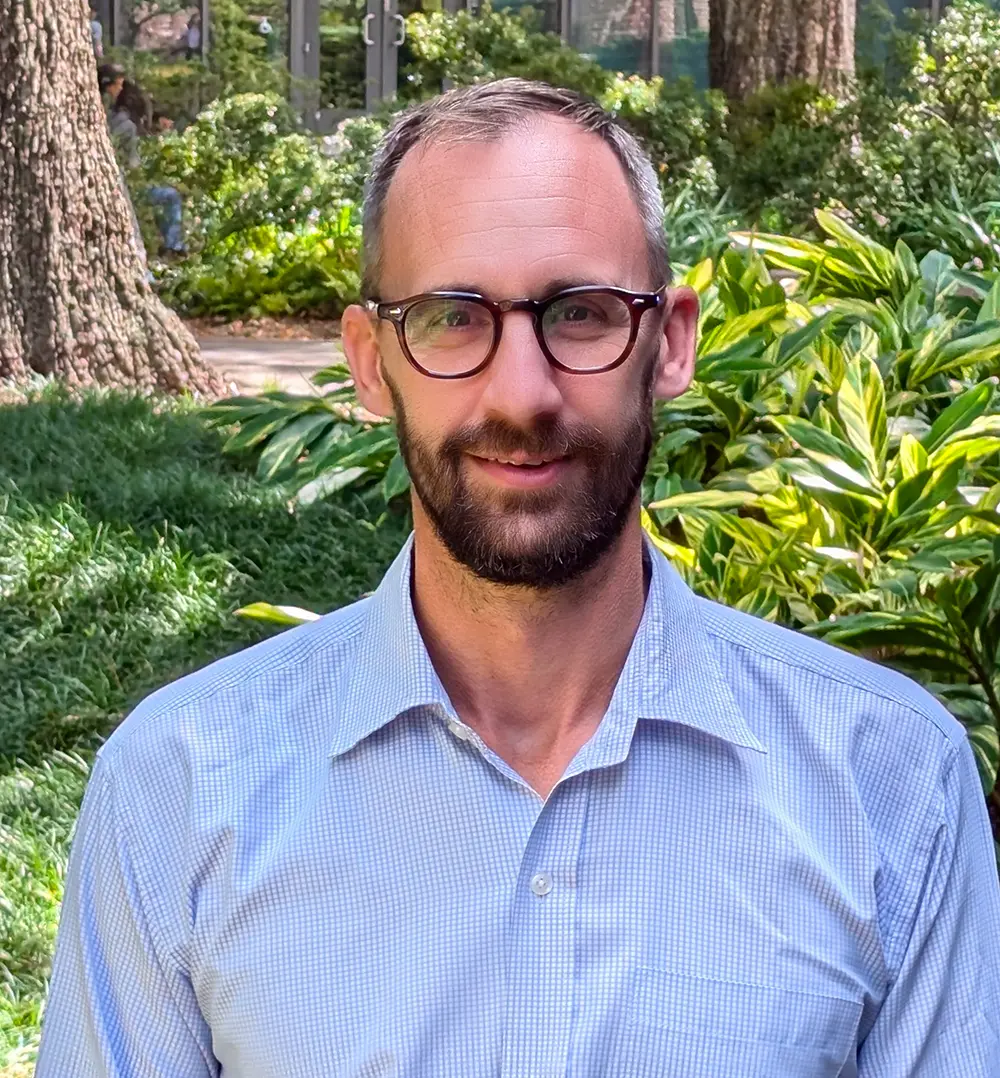
The World Health Organization (WHO) approved Xpert, a diagnostic tool the size of a desktop computer, in 2012. The test promised to identify tuberculosis (TB) earlier and immediately provide information about the best course of treatment. At the time, we expected that the introduction of this innovative tool would lead to a massive decrease in rates of TB globally. Twelve years later, however, rates remain steady, and many people are still being diagnosed by century-old, imprecise technology. WHO experts awarded me a grant to find out why.
In July 2022, I gathered a team of anthropologists, public health scholars, social scientists, and undergraduate students at Tulane, Harvard, Oxford, and Maastricht University to study Xpert implementation’s successes and failures. We assumed that people in ministries of health, TB hospitals, laboratories, and clinics in countries where TB was common knew more about Xpert than anyone else. They could help us understand what made new technology possible and where they faced or solved challenges. We dove deeply into situations in the Philippines and Nigeria and surveyed 47 people in national TB bureaucracies. We also conducted 11 focus groups with 69 people working in 15 countries.
Our team worked tirelessly to make sense of the implementors’ different perspectives, transcribing pages and pages of narrative and searching carefully for patterns and repeating ideas across contexts. We were surprised to find that, in many countries categorized as low-income, the WHO itself had recommended against this technology as the preferred test for TB due to concerns about its cost. In what would become a 50-page report to the WHO, two undergraduate volunteers began the work of writing about the data we had analyzed and creating figures to best represent it. Drafts and ideas bounced between scholars, continents, and time zones. We had Zoom after Zoom about critical but accessible ways to suggest to our funders that their own recommendations were often as much of a barrier to Xpert use as shortages in electricity, money, and laboratory expertise. Eventually, our final report illustrated that while countries had made impressive progress using these tools when available, policy decisions had slowed access to Xpert, and countries shared little knowledge about overcoming obstacles internationally.
Months later, a WHO guideline development group asked me to present our findings. These expert groups make global recommendations based on available data. They asked many questions, but finally we arrived at the concluding and critical question: “I read your report as a strong call to recommend this technology to all, is that correct?” I agreed. When the group published their recommendations, they used our work as the proof that higher-quality technologies could be implemented despite logistical and financial challenges. They changed global policy and recommended that Xpert be made accessible to all people in all countries, not just rich ones.
Our small grant and a diverse, dedicated team helped drive a major global policy shift that extended high-quality diagnostic services to millions and takes us one step closer to global health equity.

